Aoostar TB4S-OC NVMe USB4 and Oculink DAS Review
As much as I love to talk about network attached storage (NAS), I would be lying if I said I didn’t have a soft spot for direct attached storage (DAS – also referred to as locally accessed storage). Even though traditional NAS has been around now for several decades, direct attached storage has been around almost as long as the subject of data storage itself. The advantages and desirability of add-on locally accessible storage have appealed to practically everyone, and as network attached storage has continued to evolve, direct attached storage has not exactly been putting its feet up with a paper and a cup of tea! Fantastically fast connections like USB4, Thunderbolt 4 and the increasingly popular Oculink — which is effectively PCIe external connectivity, made easy! Into this growing and exciting field of storage, AOOSTAR has launched the TB4S-OC, an enclosure that connects via 40Gbps USB4 or Oculink! Originally designed as a NAS expansion device, as many of the growing range of appliances in NAS and mini PCs support both of these ports, this allows you to immediately add four Gen 3 SSDs to your operating system of choice and greatly boost your storage performance.
| Specification | Details |
|---|---|
| Model | AOOSTAR TB4S-OC |
| Material | Aluminum Alloy |
| Storage Capacity | Single slot supports up to 4TB, total capacity of up to 16TB |
| Supported SSD Type | 4x M.2 2280 NVMe SSDs (PCIe 3.0, backwards compatible) |
| Interface Ports | 1x Oculink port, 1x USB4 port, 1x DC power port |
| Transfer Speed (Per Slot) | Up to 800MB/s |
| Total Transfer Speed | Up to 2.5GB/s in RAID 0, 2.1GB/s in RAID 5 |
| Power Supply | DC charger (included in the box) |
| Cooling System | Base-mounted, silent active cooling fan |
| Thermal Performance | 47°C during read tests, 46°C during write tests, 41-42°C during copy tests |
| RAID Support | Software-based RAID (JBOD, RAID 0, RAID 5) |
| Chipset | ASM2462PDX (low power consumption design) |
| Product Dimensions | 10.7 x 10.7 x 2.9 cm |
| Weight | Compact and portable |
| Included Accessories | Oculink cable, USB4 cable, DC charger, 4x SSD heatsinks, adapter cable (for GEM10 series) |
| Compatibility | USB4 and Oculink compatible mini PCs, laptops, and NAS systems |
| Price | $179.00 |
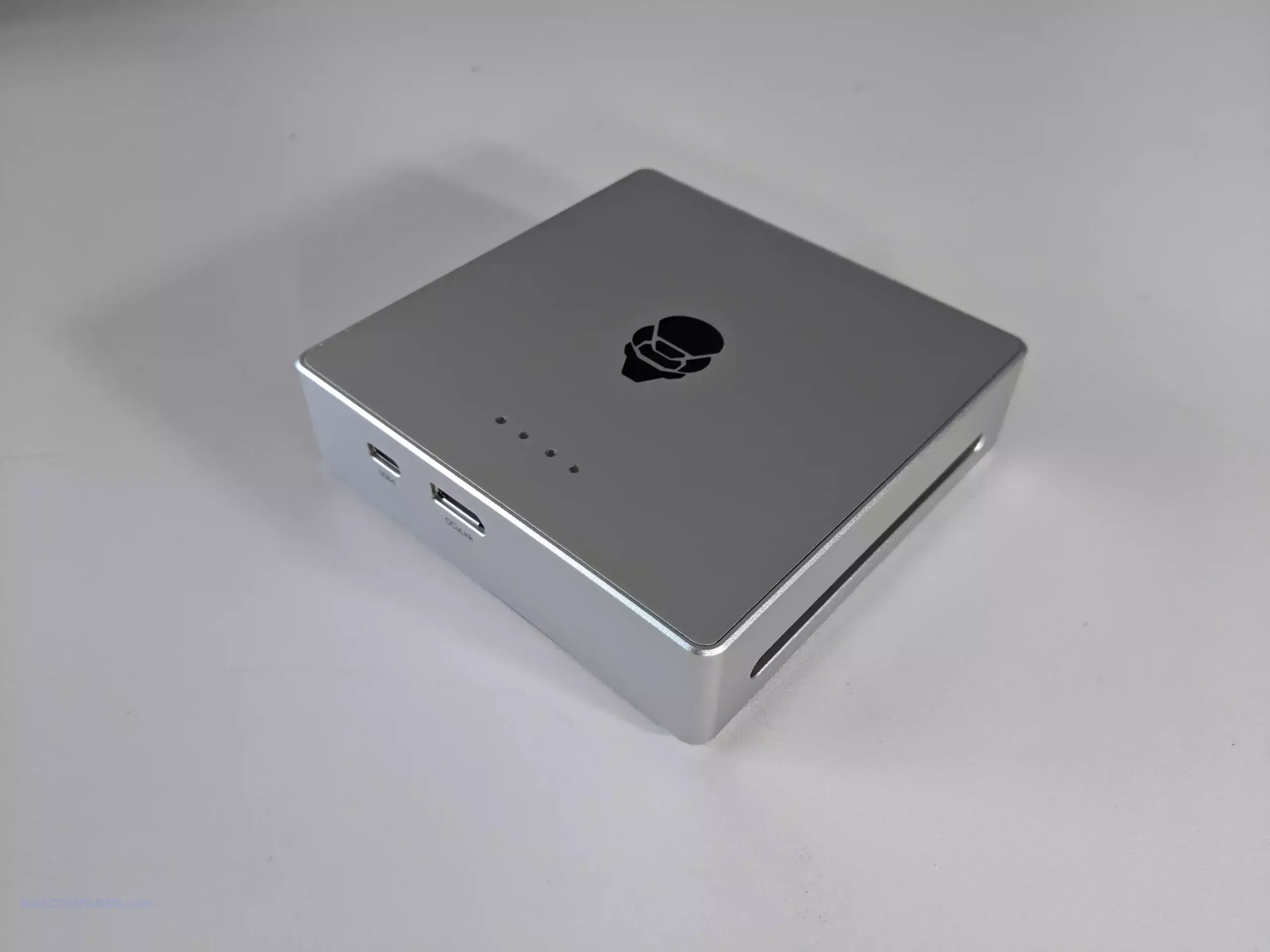
Aoostar TB4S-OC Review – Quick Conclusion
The AOOSTAR TB4S-OC NVMe USB4 and Oculink DAS offers high-speed storage expansion with USB4 and Oculink interfaces, supporting four M.2 NVMe SSDs with transfer speeds up to 800MB/s per slot. Compact and efficient in design, it includes a base-mounted cooling fan for heat management during heavy workloads. While it lacks hardware RAID support, it relies on software RAID for managing multiple SSDs. In testing, the TB4S-OC showed consistent performance with 822MB/s read and 788MB/s write speeds, and 265MB/s for SSD-to-SSD transfers. In RAID 0, it reached 2.5GB/s and 2.1GB/s in RAID 5 with the AOOSTAR GEM10 mini PC/NAS. Its thermal management kept SSD temperatures safe, peaking at 47°C during read tests. Though versatile, it is limited by the lack of hardware RAID and compatibility with older USB ports.
Where to Buy a Product





![]()
![]()

VISIT RETAILER ➤






![]()
![]()

VISIT RETAILER ➤






![]()
![]()

VISIT RETAILER ➤






![]()
![]()

VISIT RETAILER ➤
 DEAL WATCH – Is It On Offer Right Now? DEAL WATCH – Is It On Offer Right Now?These Offers are Checked Daily
|
AOOSTAR TB4S-OC Review – Design
AOOSTAR has been a growing name in the world of network attached storage for a few years now, releasing some pretty unique devices into the market. In the last 12 months we have reviewed several different devices, such as the GEM10, from this brand that have factored in support of both USB4 and Oculink connections.
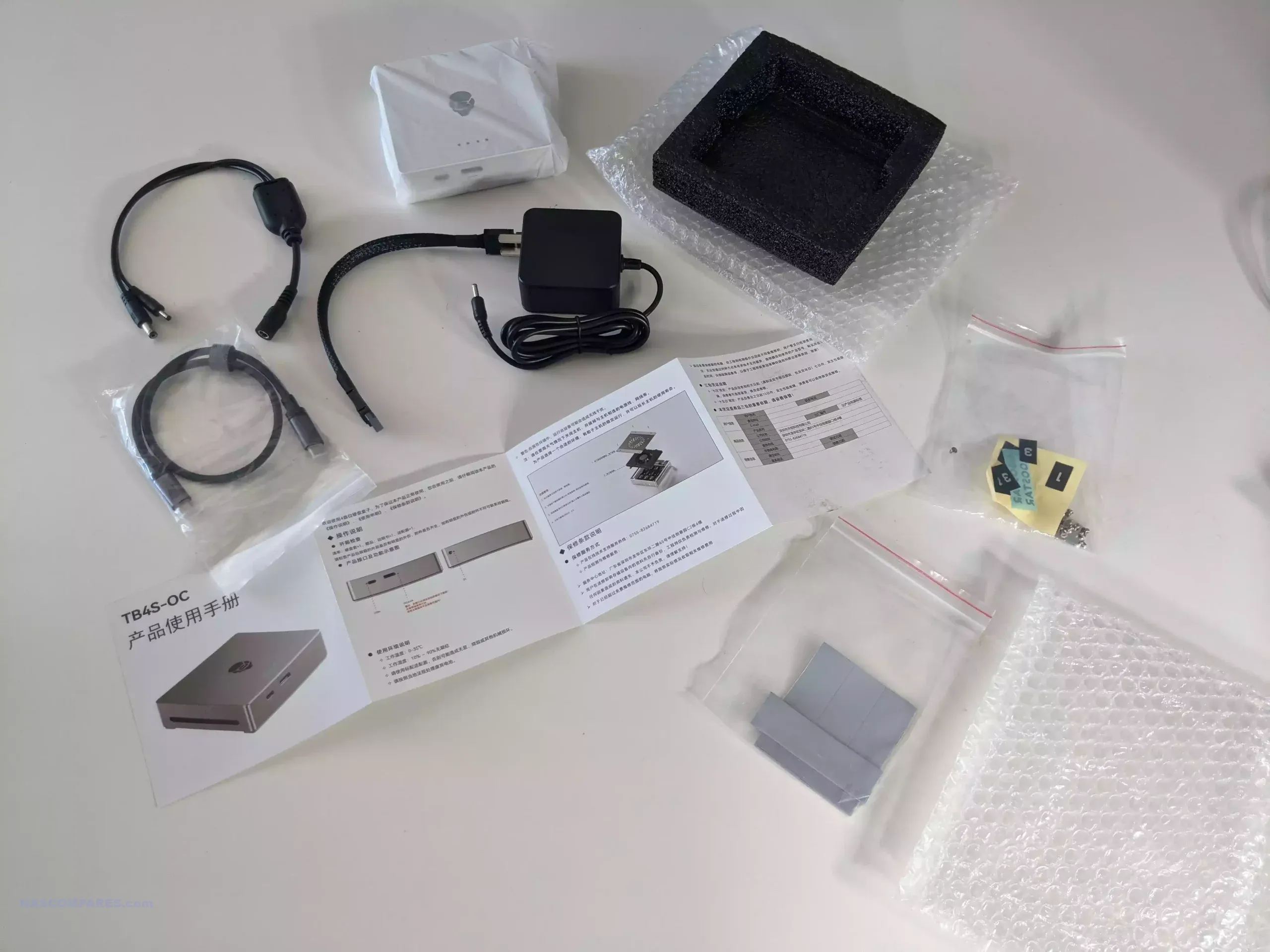
AOOSTAR TB4S-OC will allow you to expand via USB4 (and indeed, the 64Gbps connection of Oculink) and not only expand your original storage but expand it with genuinely fast NVMe storage that can match the performance of internal SSDs.
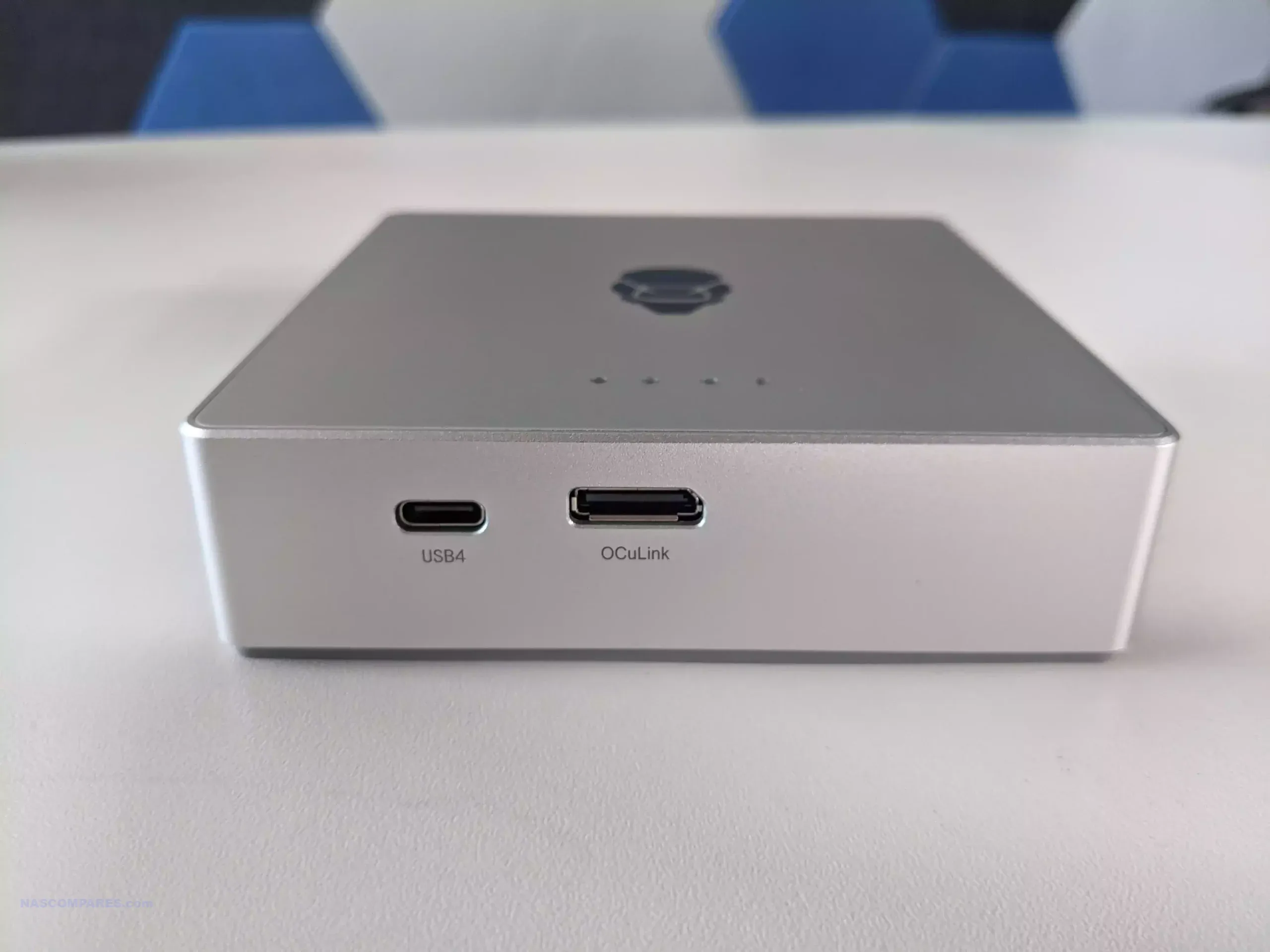
Up until this point, if you wanted to expand a NAS using USB, you were limited to simply expanding with slower hard drives or utilizing slightly faster SSDs. As good as these sound, they pale in comparison to the faster M.2 NVMe storage provided by the system’s internal SSDs.
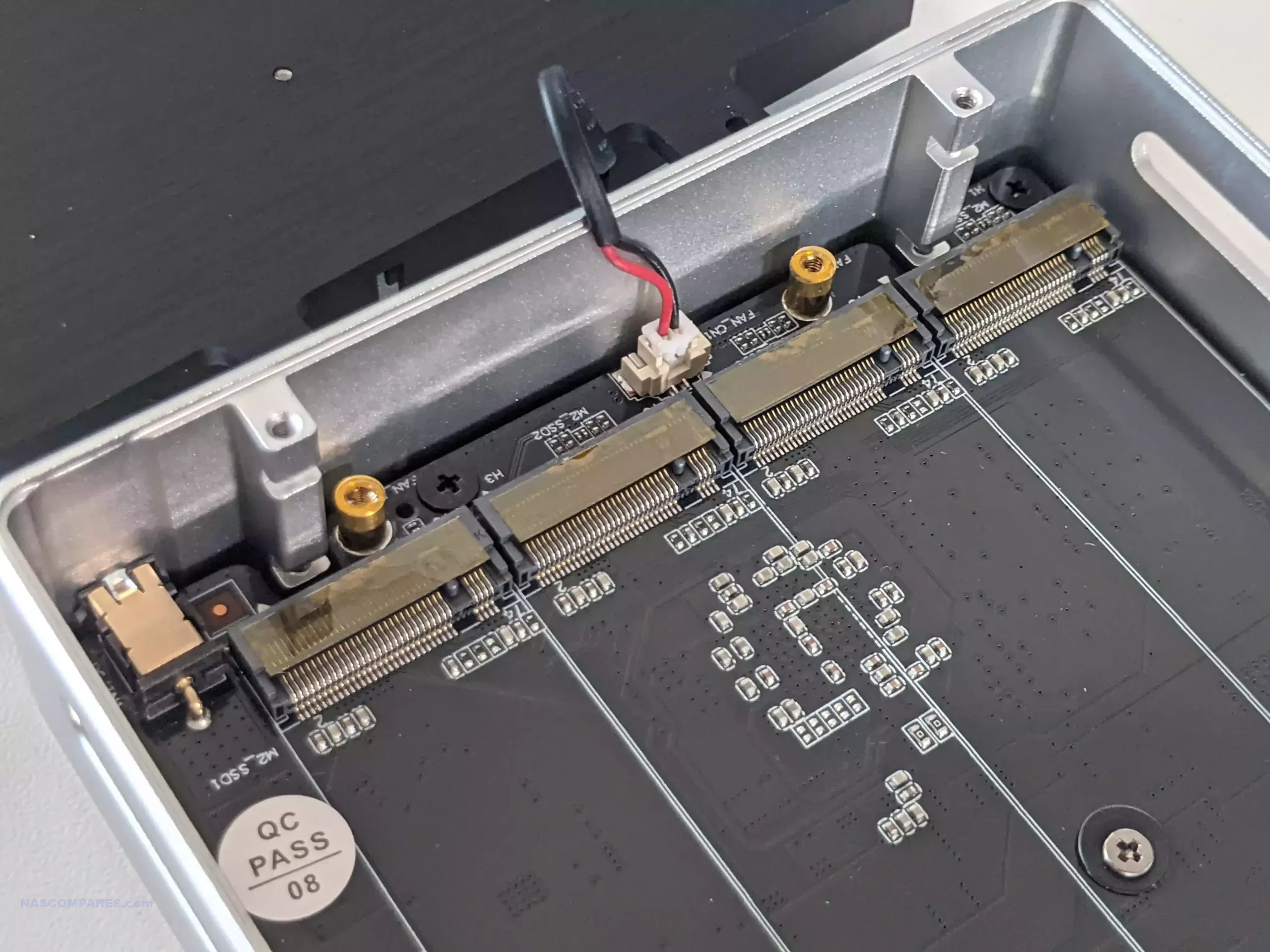
Some users, of course, quite like this, as it allows them to use the internal SSD bays inside their NAS for hot data, while utilizing the slower external USB storage on hard drives and SATA SSDs for cold storage long-term.
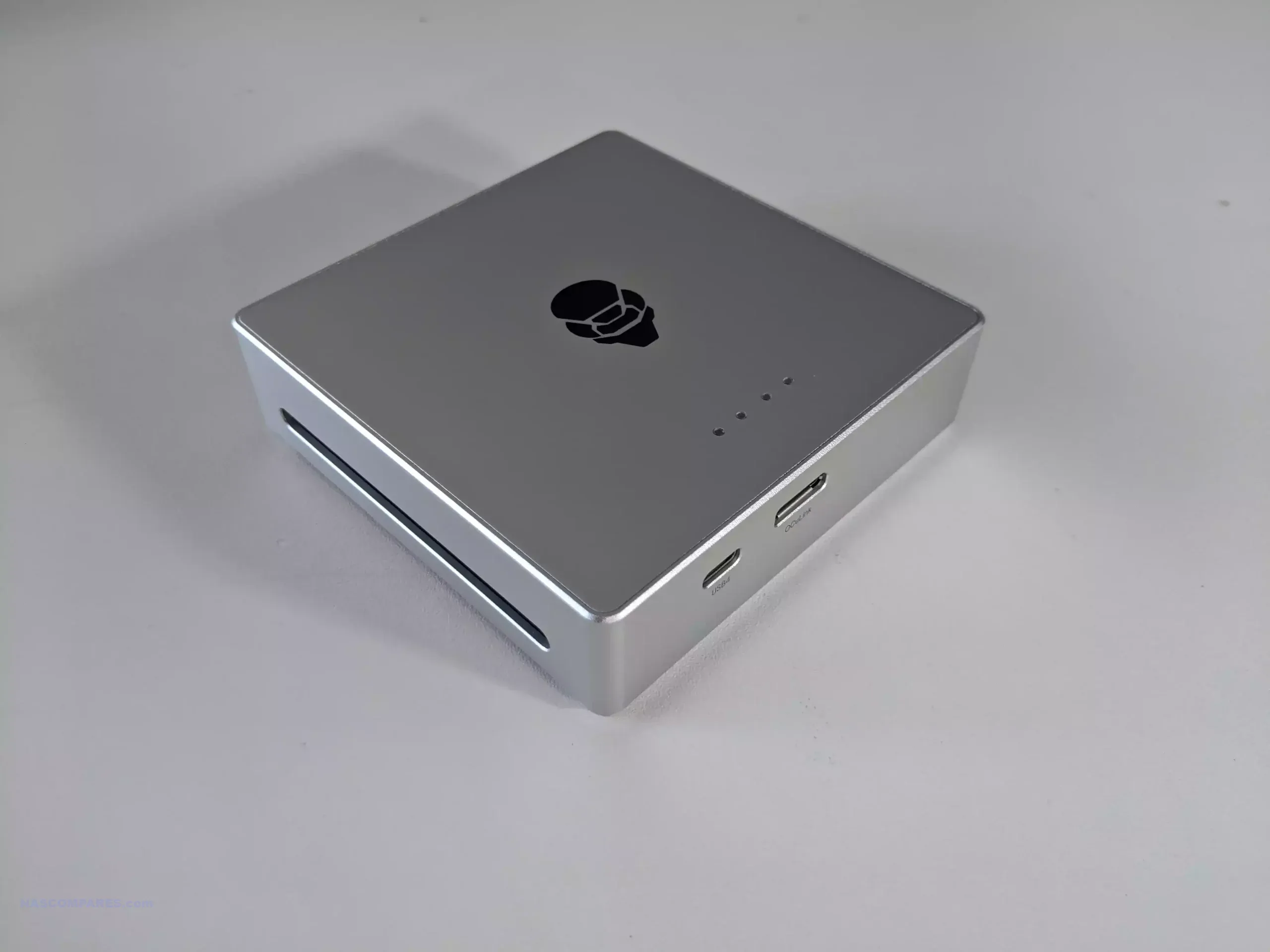
However, that still means the transfer of data between the main NAS and the external system on most traditional expansion devices is limited to USB, which ends up being between 500MB and 1,000MB per second (depending on the version of USB 3.2 you are using).
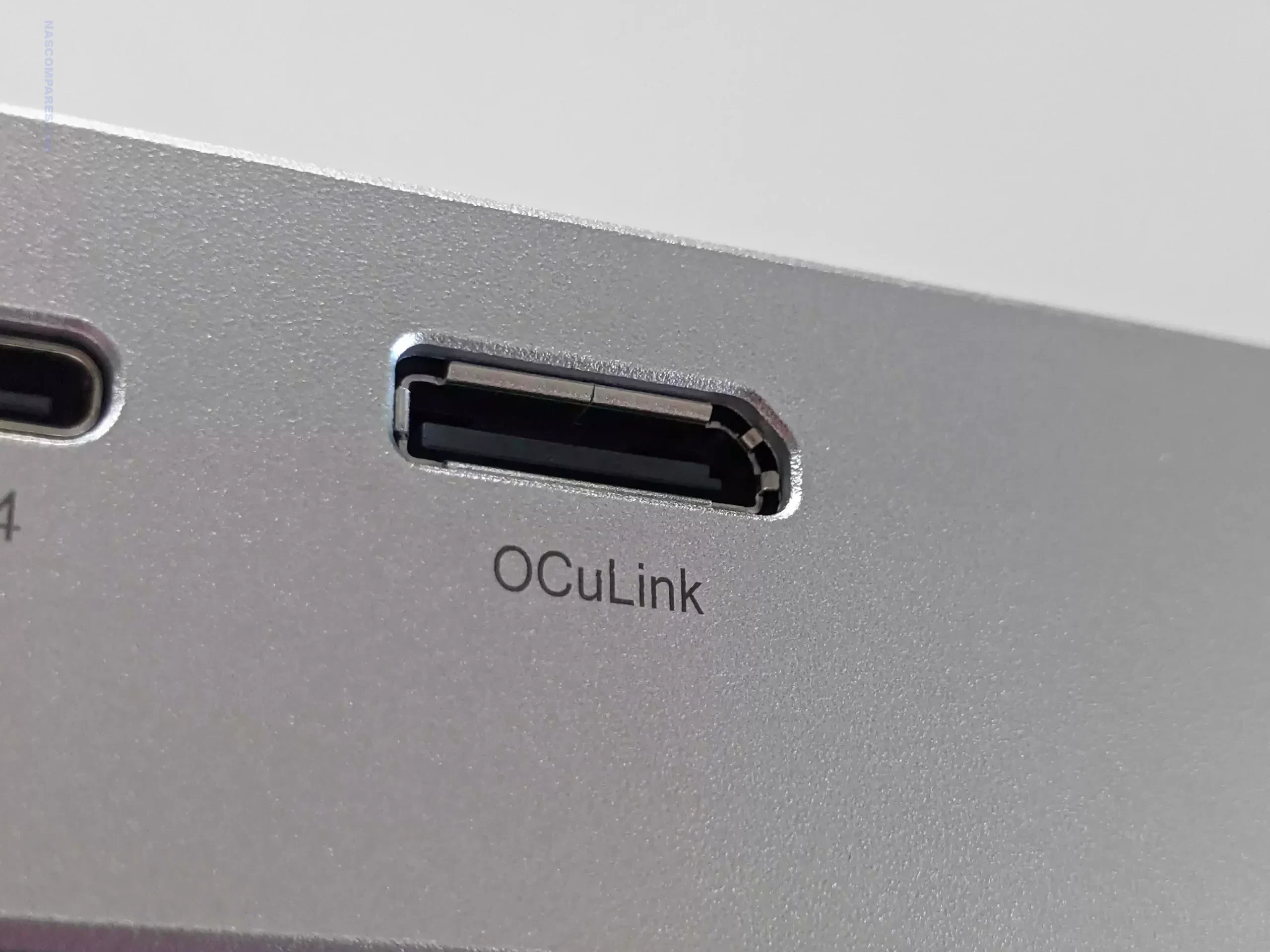
However, the TB4S-OC being able to take advantage of USB4 or Oculink will massively open up the bandwidth afforded between the NAS and the expansion system. So that means that hot data can be stored externally if needed, or even just warm data, and data can be moved between a NAS and expansion up to a maximum of 6,400MB per second.
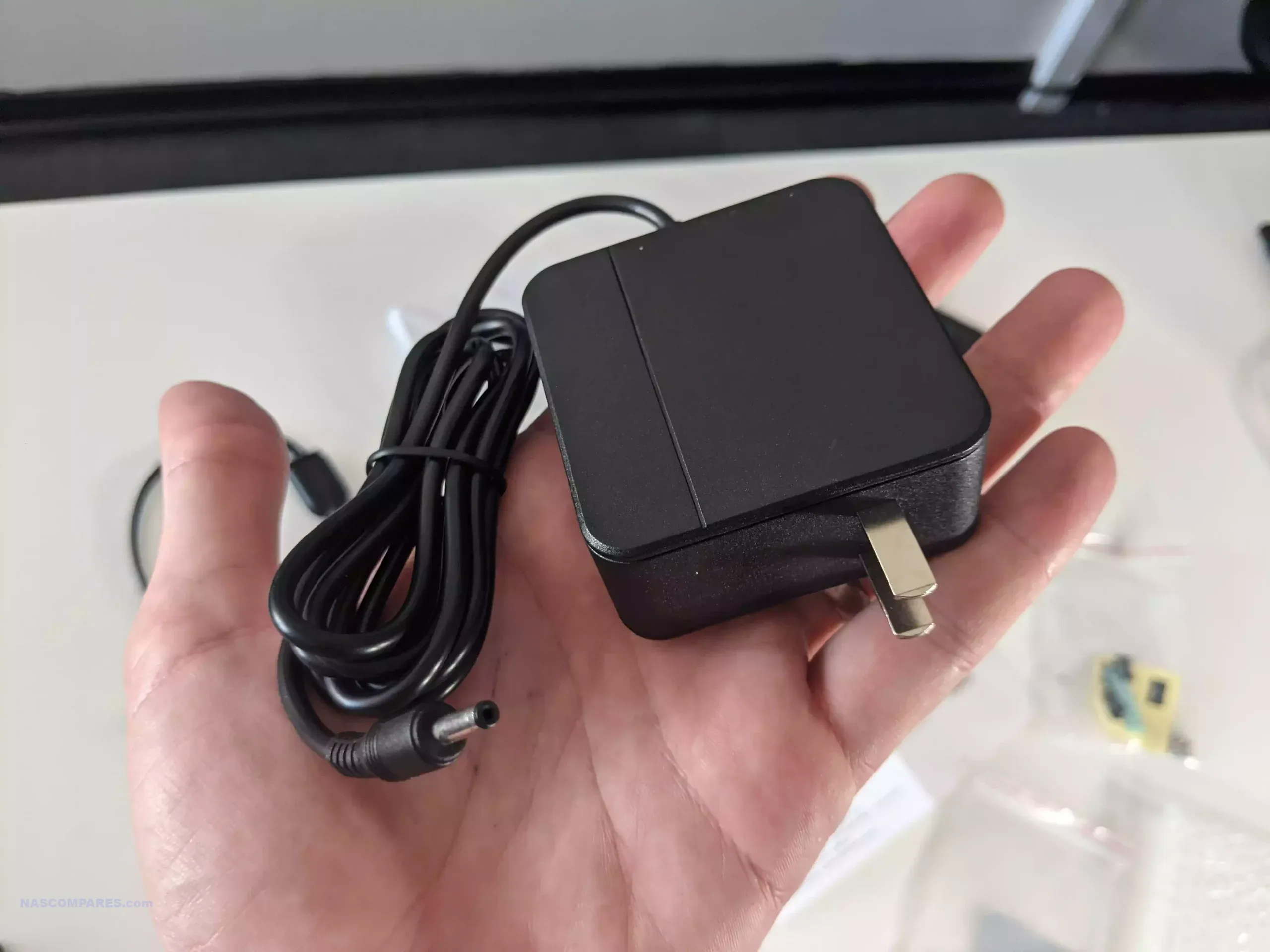
That said, you are still going to need external power. Luckily, the system arrives with a pretty decent external PSU.
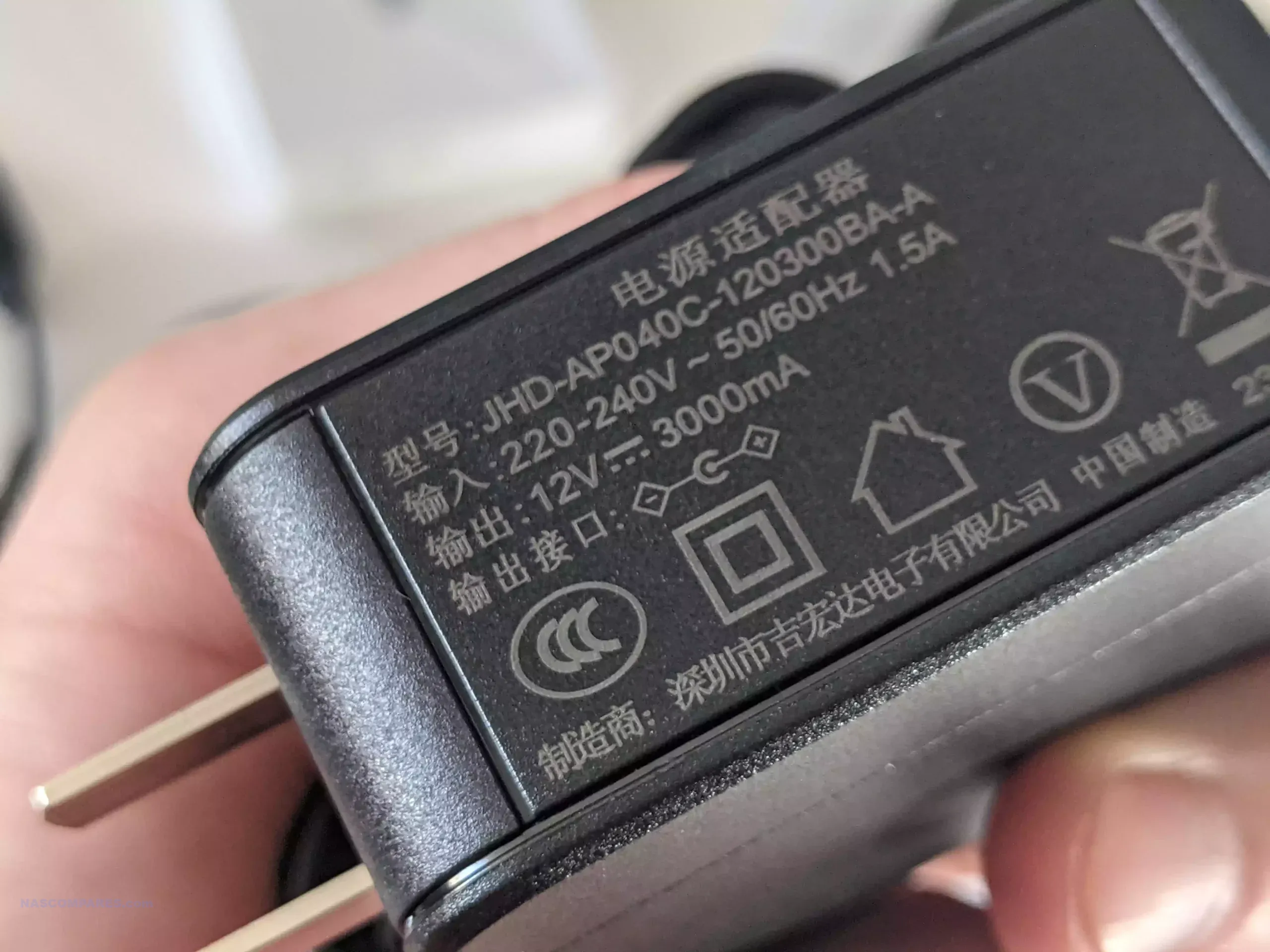
Regarding maximum performance potential, this is heavily dependent, of course, on the lanes afforded to the SSDs inside an expansion, as well as the SSDs themselves, but this is still a massive increase over what traditional USB expansions have been able to provide to NAS directly previously.
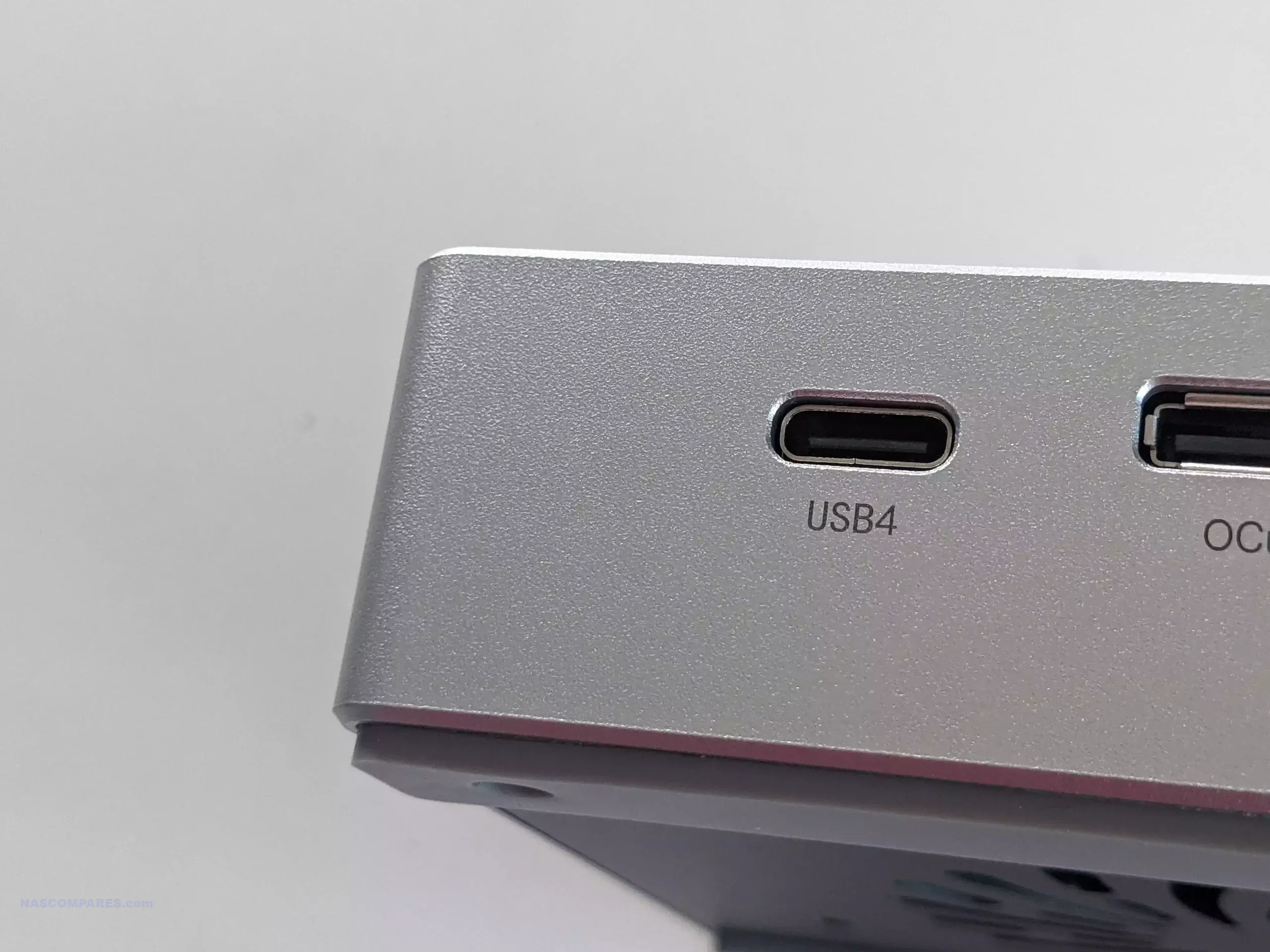
The TB4S-OC arrives as an incredibly compact external enclosure that easily fits within your hand. The system features a base-mounted, silent, active cooling fan. I was not able to find much in the way of fan control when connecting this to the GEM10 AOOSTAR system with Unraid running, but that does not mean that other NAS operating systems would not be able to control the enclosure fan via their own control panel.
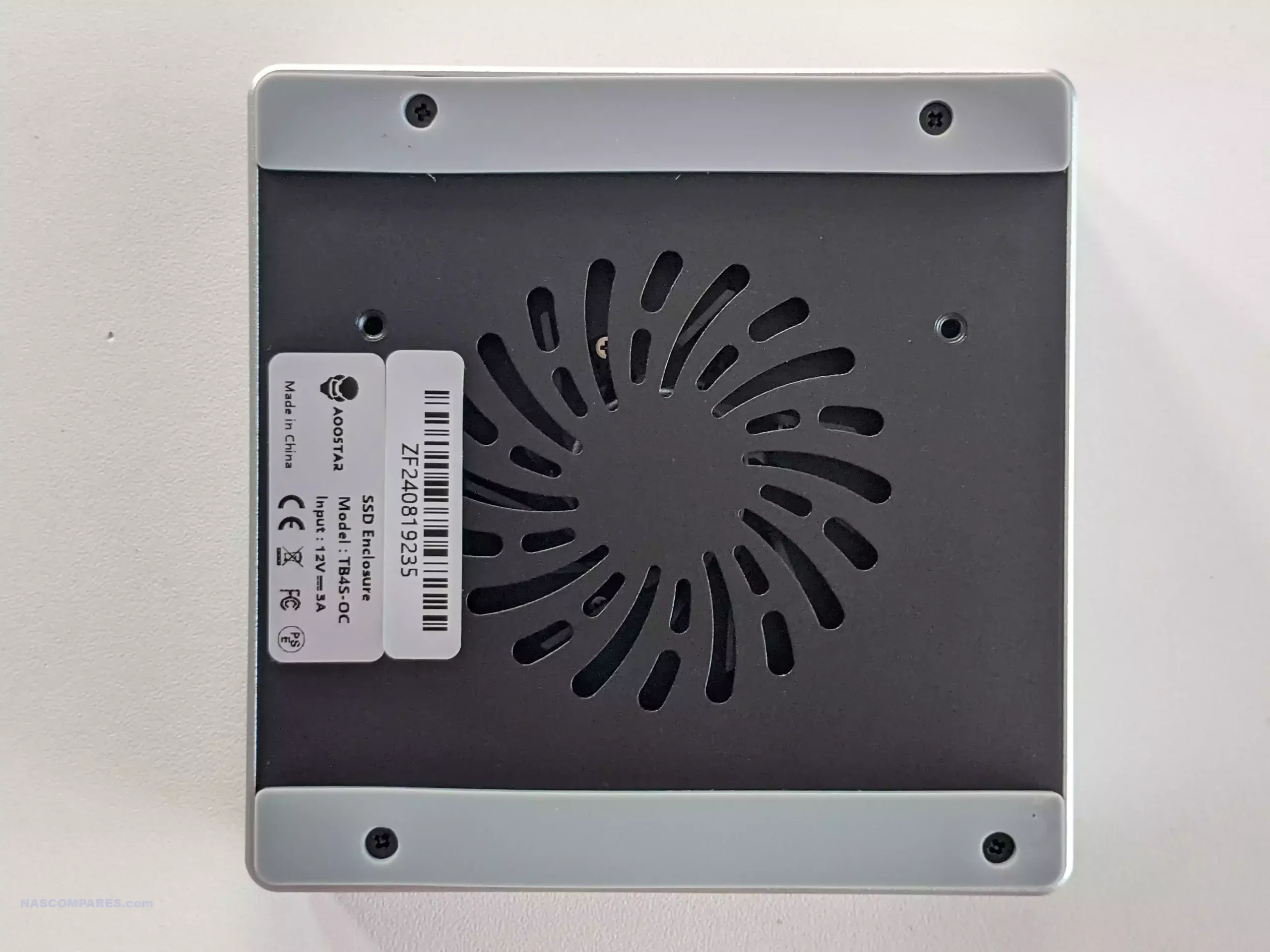
One neat little extra is that the system also includes a power supply splitter. It a small extra, but definitely appreciated.
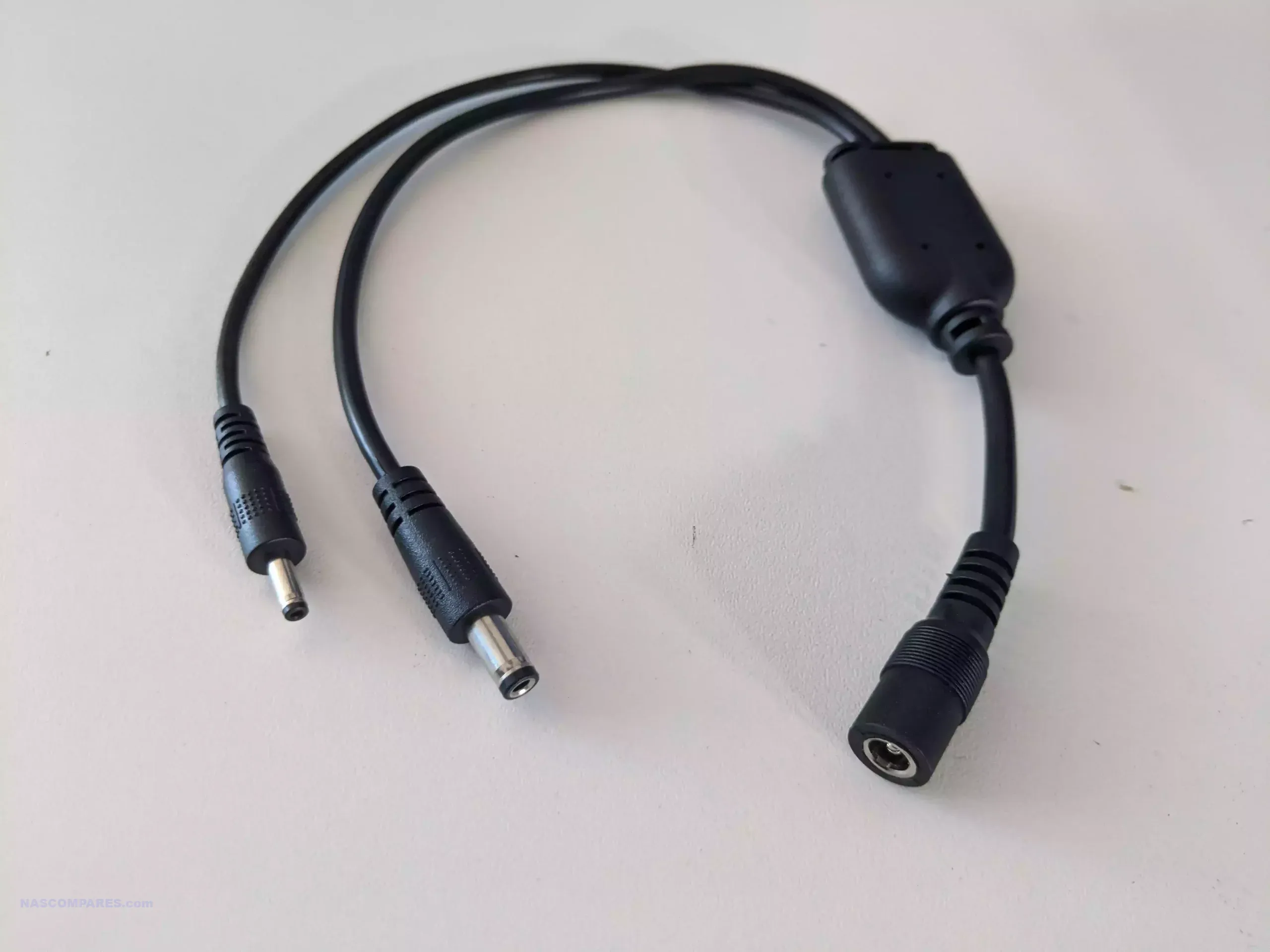
The 2nd connector on the splitter is a standard barrel power connection and can be attached to a similar barrel PSU.
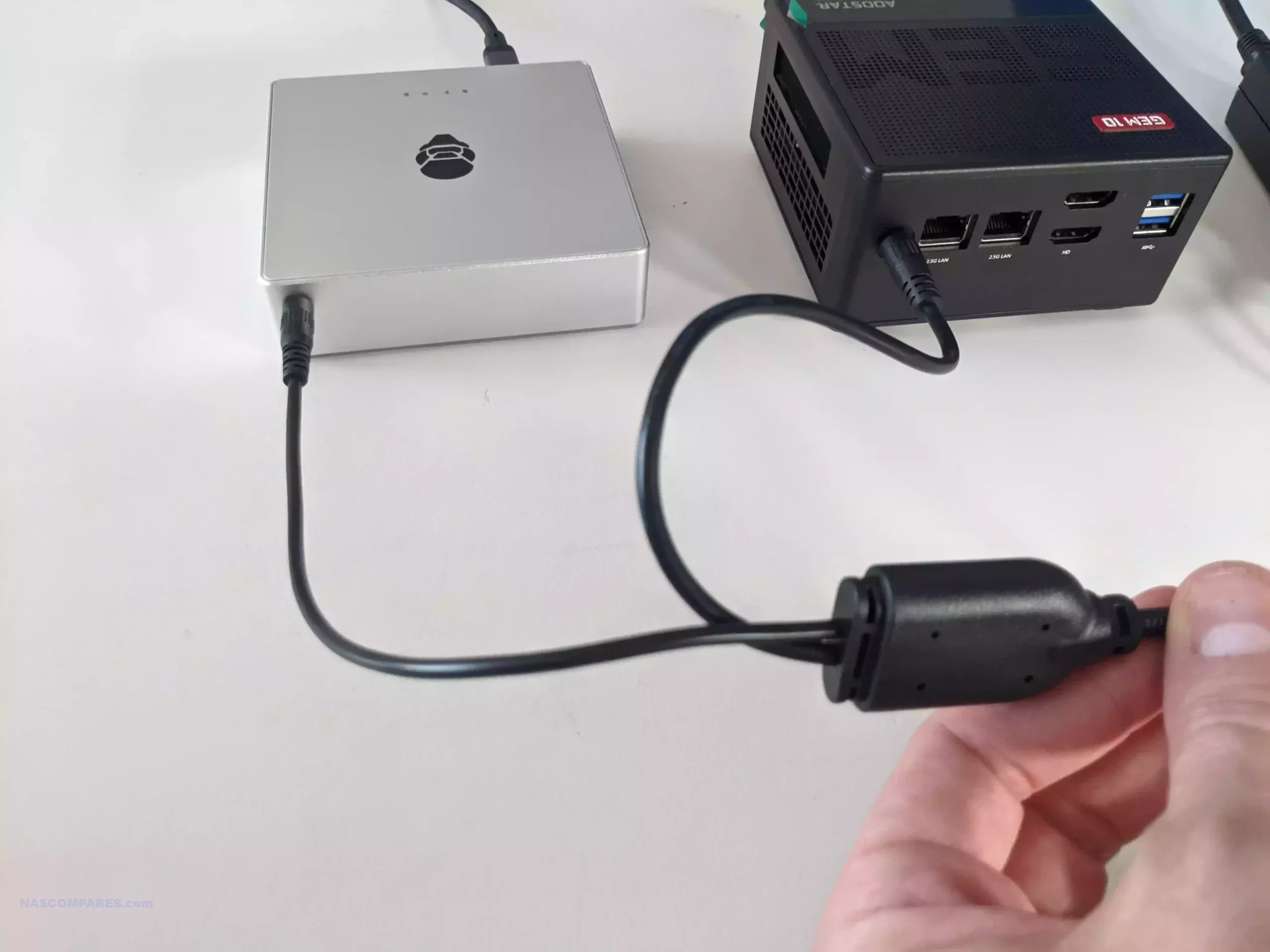
Under the base panel is a larger fan assisted heatsink panel.
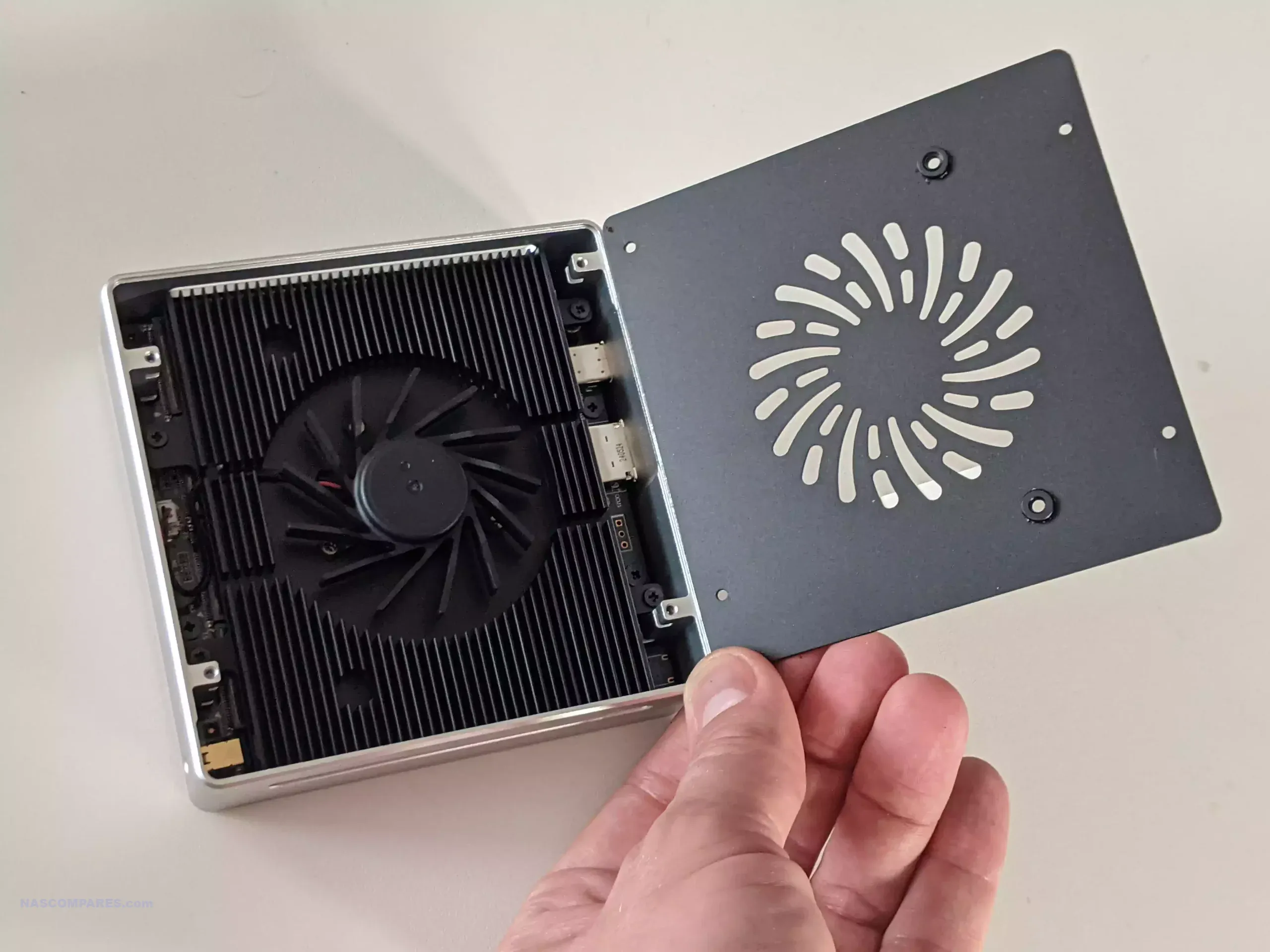
This sits directly on top of the M.2 Slots and the kit includes the m.2 thermal panels to allow for dissipation from the drive into the heatsink.
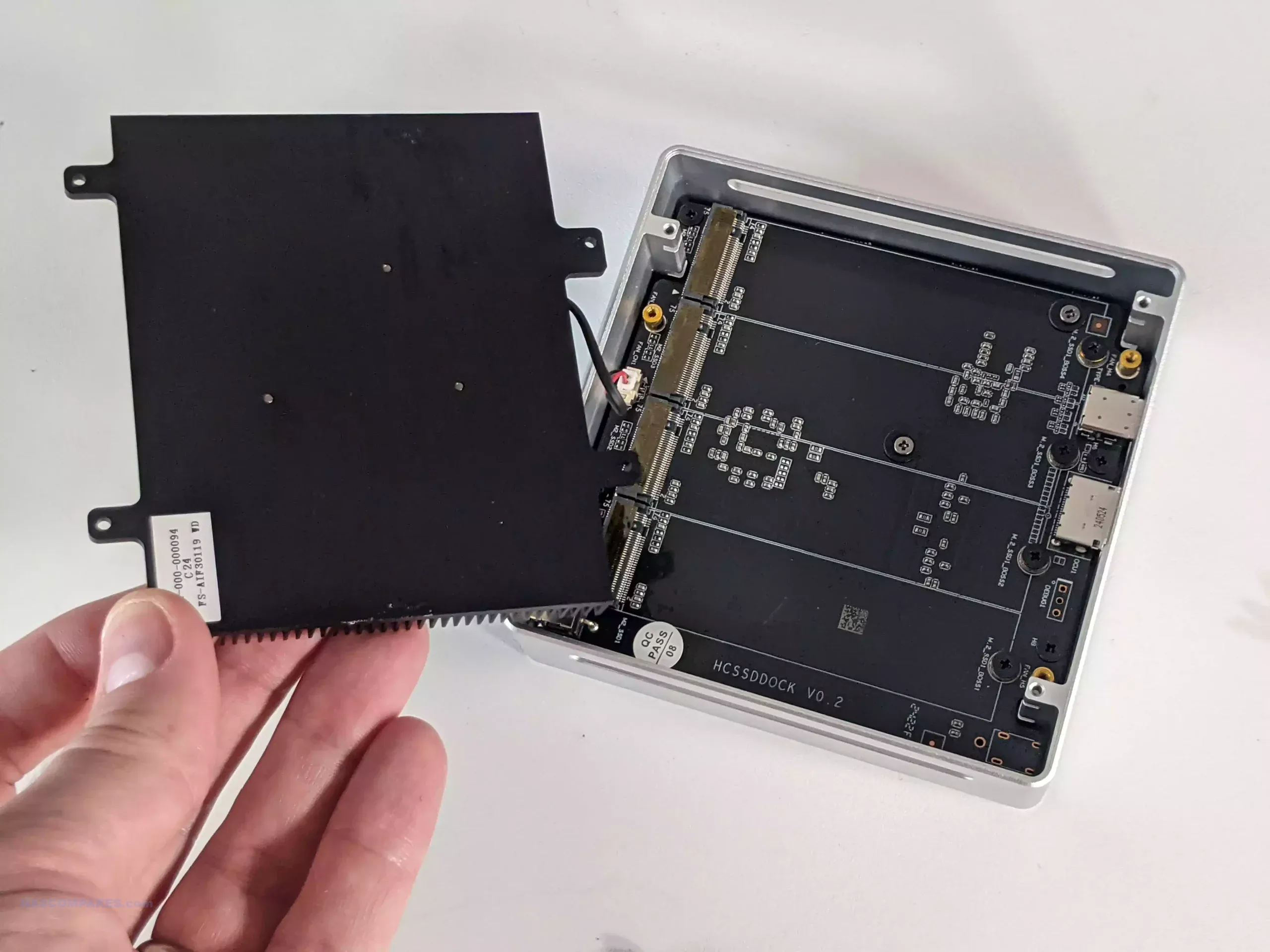
Removing the base-level fan shows us the internal 2280 length M.2 NVMe slots.
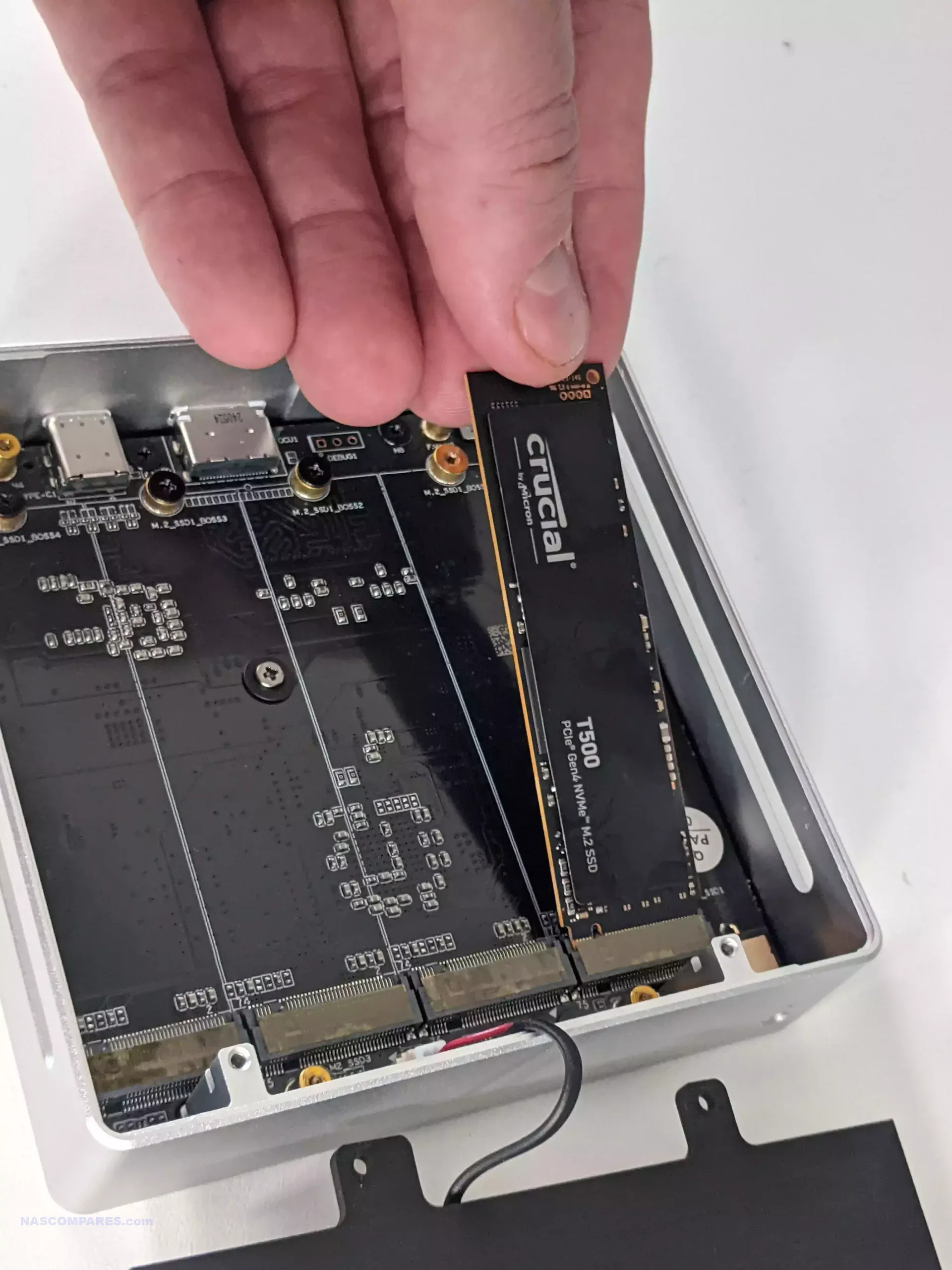
Each slot is a Gen 3 x1 lane speed interface, which means that each one can provide somewhere between 800MB to 1,000MB per second bandwidth to a connected drive.
AOOSTAR TB4S-OC Review – Storage
There are definitely going to be some users disappointed to hear this, as even fairly average class Gen 3 x4 SSDs have the potential to reach 3,000MB per second bandwidth, but clearly there has to be some lane distribution at play, and all of these drives are being fed into a singular controller that needs to be USB4 compliant at 40Gbps.
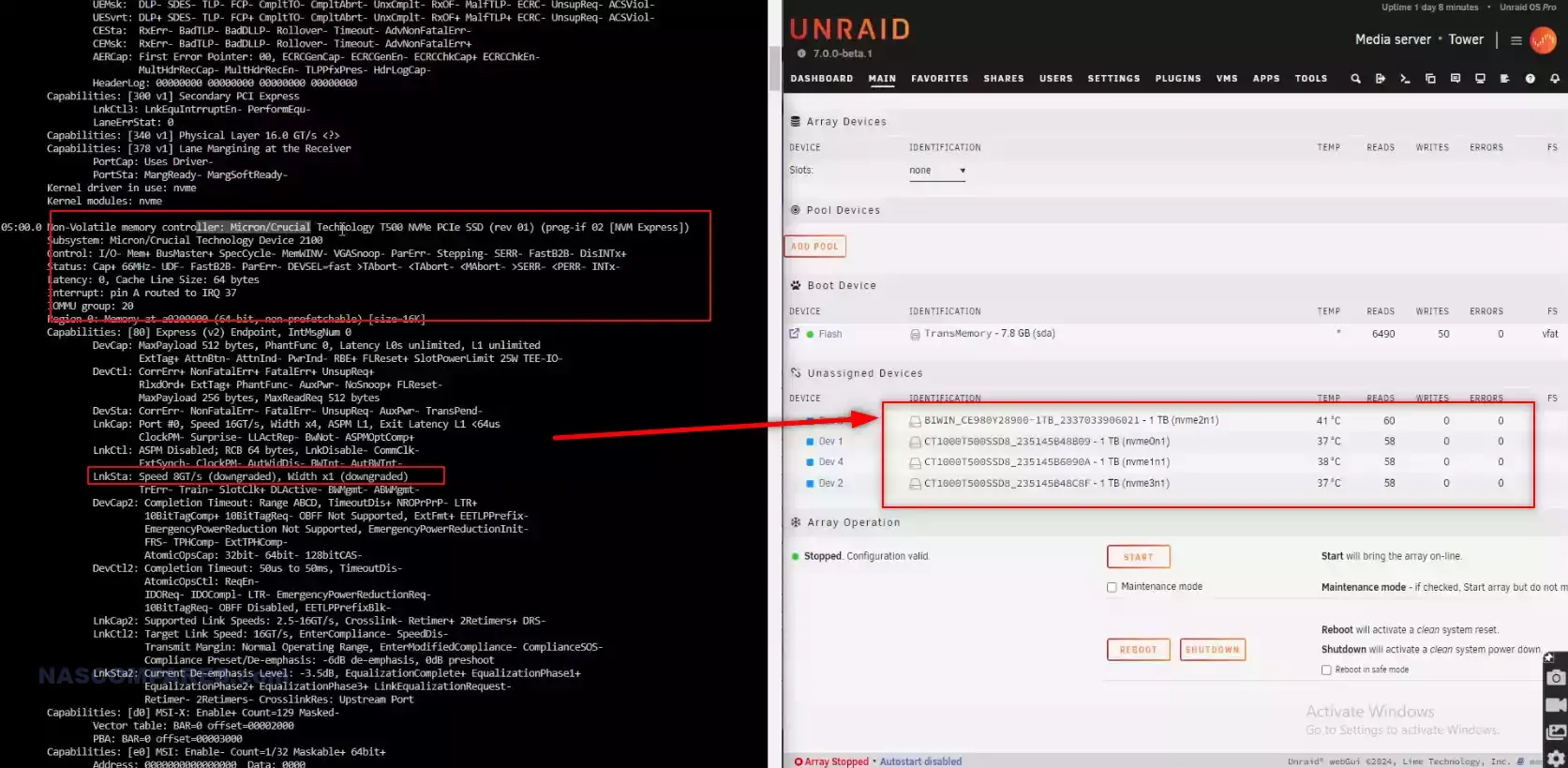
The system does not support any internal hardware RAID and is supplied as JBOD only. This is not the end of the world, as the majority of expansion DAS boxes in recent years have arrived in JBOD form, and although as just a typical USB direct attached storage device support for a hardware RAID would be desirable, it is less so in the world of modern NAS.
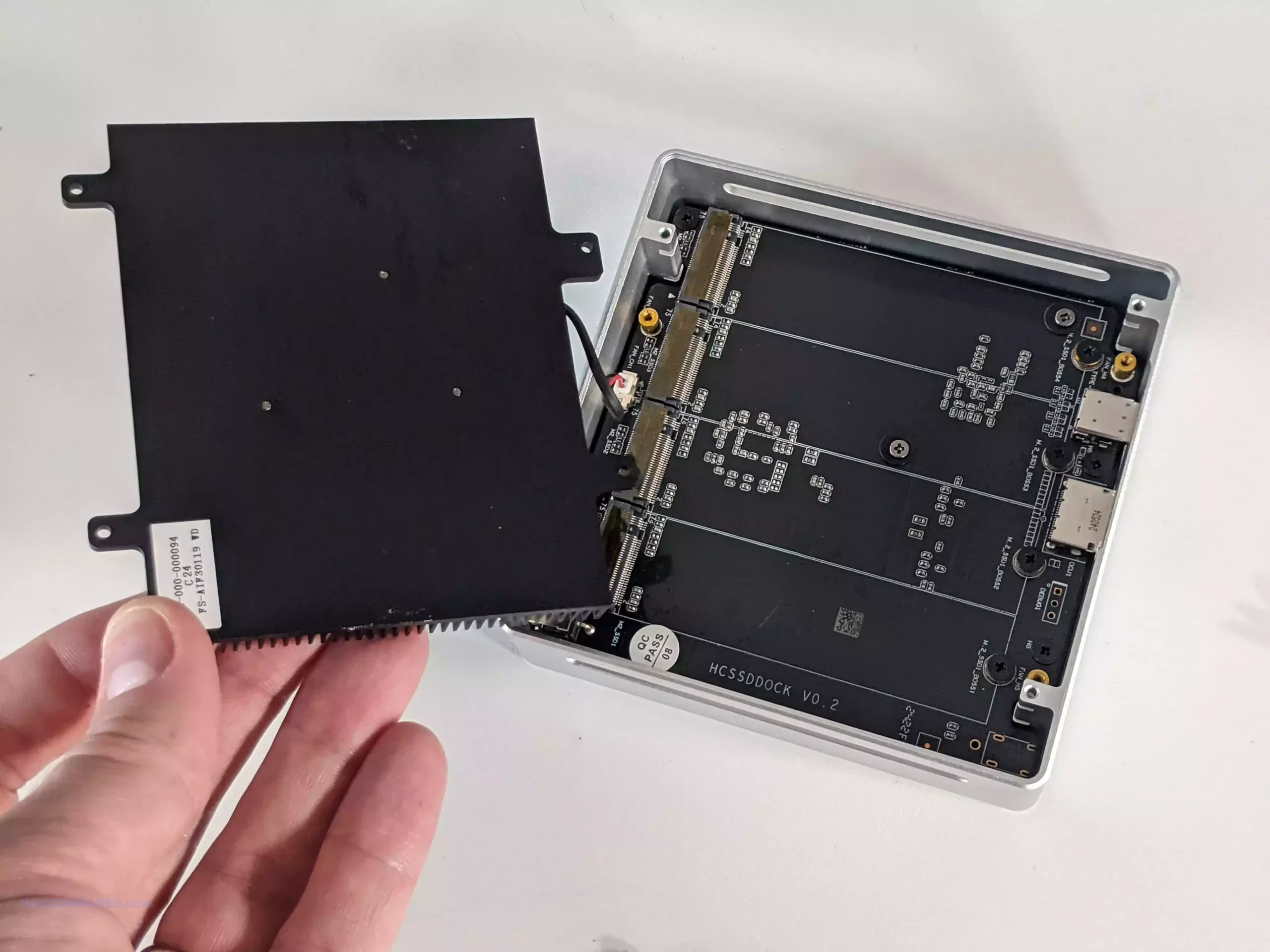
Equally, improved efficiency of CPUs and RAID management have also significantly reduced the overhead that managing RAID on an external box would have had in previous years.
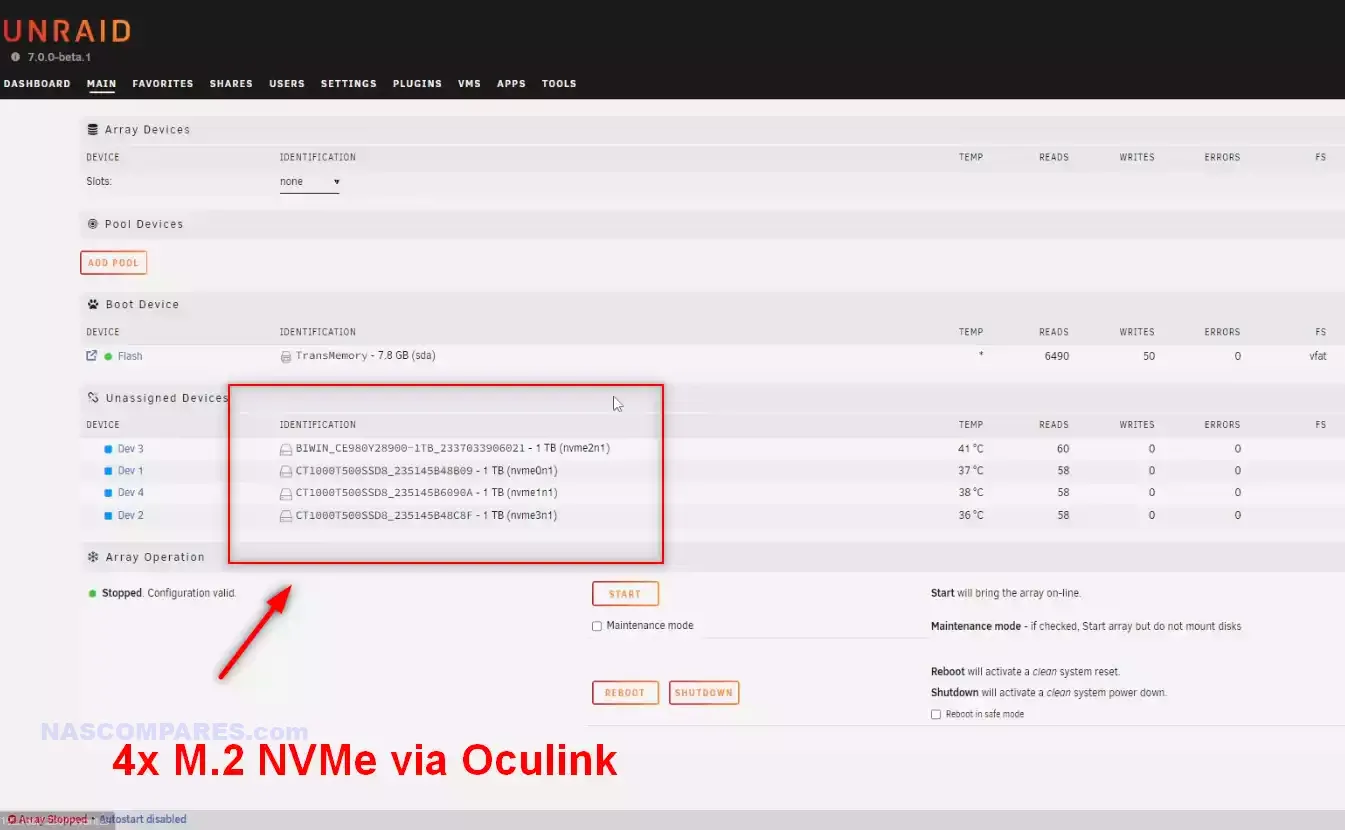
The benefits of RAID across multiple drives are fairly well documented, and these four SSDs, if pooled in RAID 0 or in RAID 5 with a single disk of redundancy, would significantly improve performance and eat up a lot more of that USB/Oculink bandwidth up for grabs.
RAID video embedded picture
AOOSTAR TB4S-OC Review – Performance Testing
When it comes to performance, the AOOSTAR TB4S-OC delivers solid results across both read and write operations, as well as internal data copying. Below are the performance metrics based on testing:
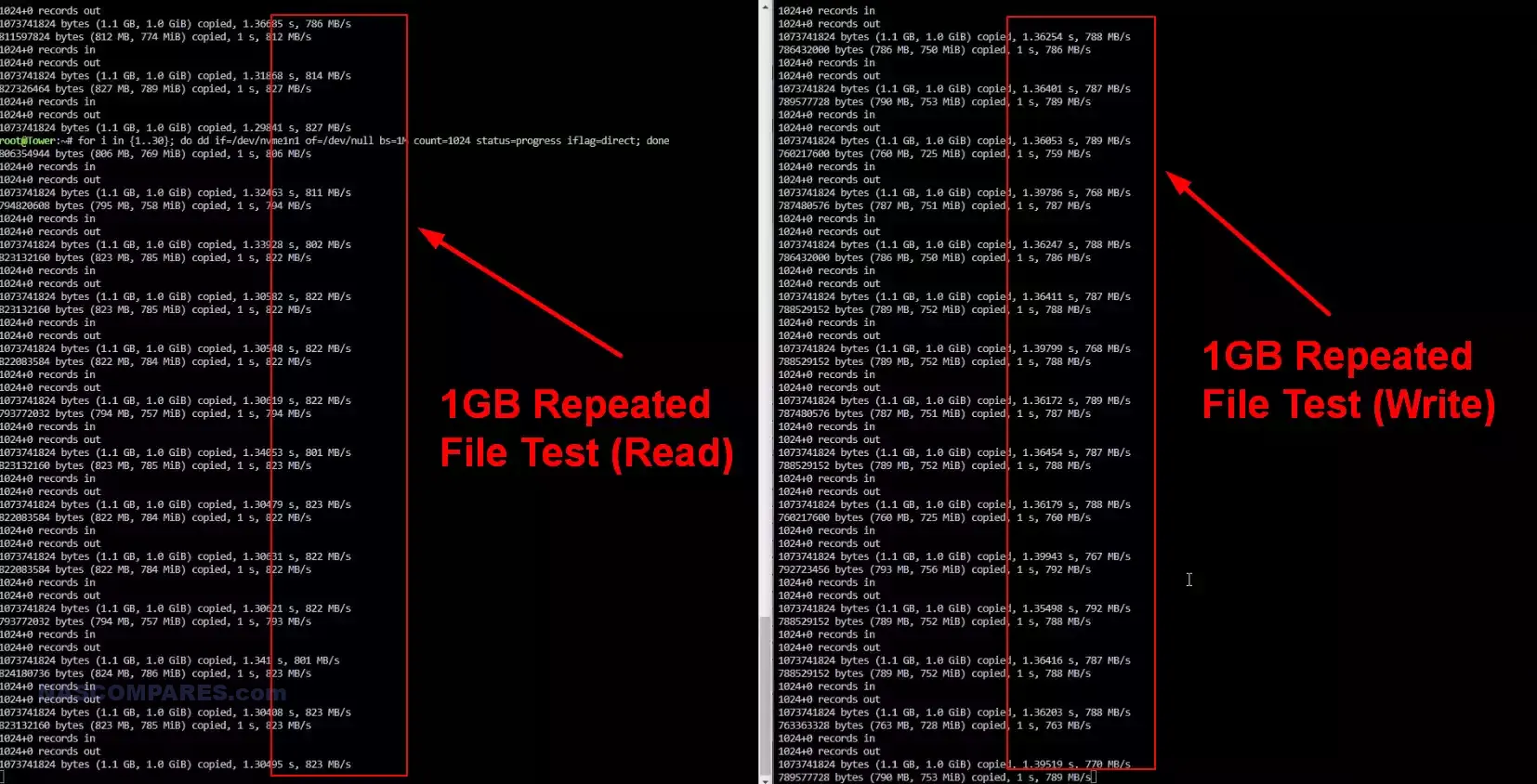
- 1 SSD Read Performance: 1GB File Creation, 90x, via Terminal/SSH = 822MB/s
- 1 SSD Write Performance: 1GB File Creation, 90x, via Terminal/SSH = 788MB/s
- Copy 1GB from SSD 1 to SSD 2: 1GB x20, via Terminal/SSH = 265MB/s
Although the write performance is slightly lower than the read performance, these figures are very respectable and demonstrate how well the TB4S-OC handles typical NAS or DAS expansion tasks. Copying data between SSDs is a bit slower, but still well within acceptable performance for the system’s configuration.
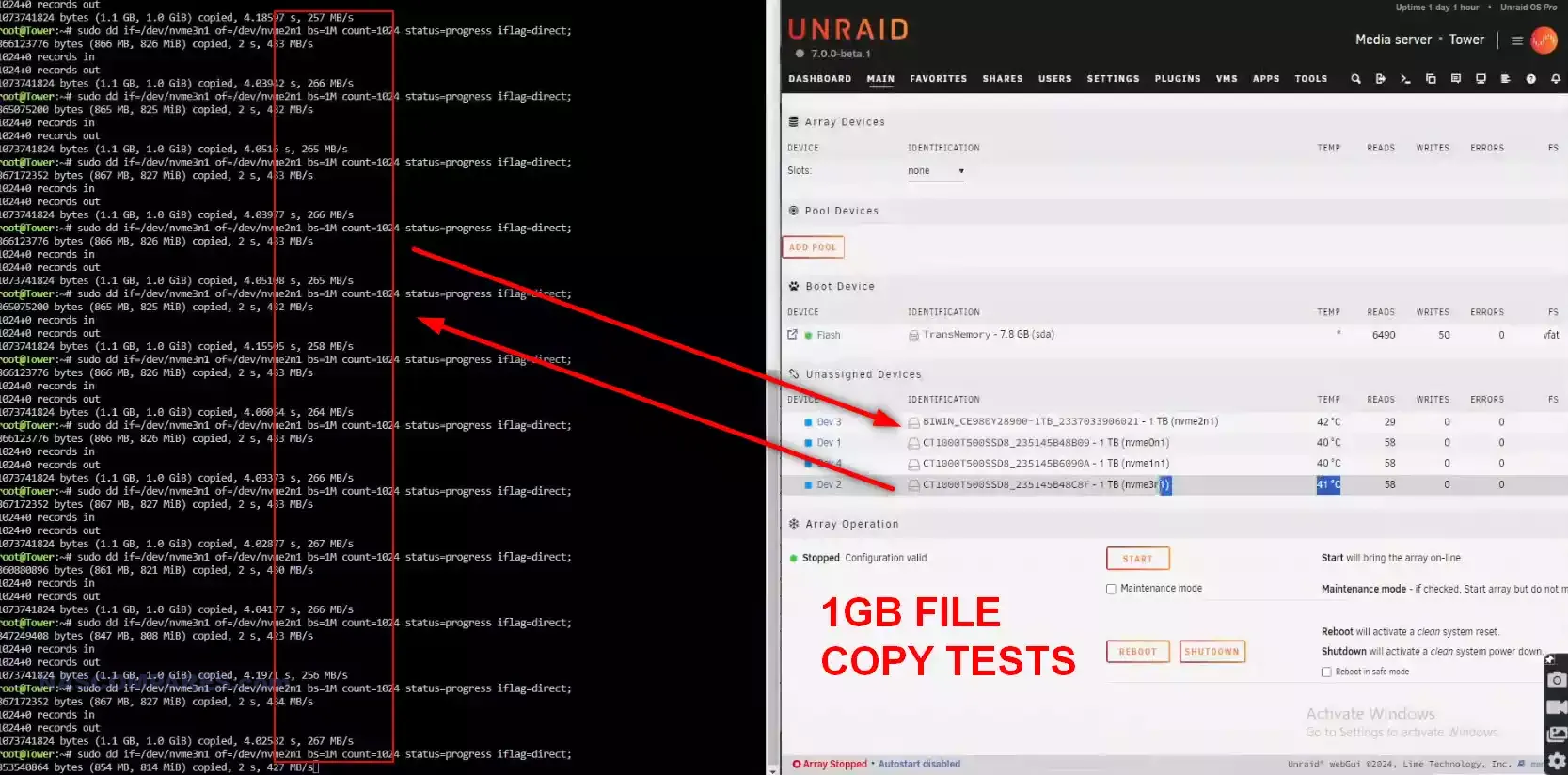
Thermal management is also worth noting, with the system effectively dissipating heat during intensive tasks.
- During SSD Read Tests, the SSDs peaked at just 47°C.
- During SSD Write Tests, the SSDs peaked at 46°C.
- During SSD Copy Tests, SSDs peaked at 41-42°C.
These temperatures are well within safe operating ranges for SSDs and indicate that the AOOSTAR TB4S-OC is able to handle sustained workloads without risking overheating or performance throttling.
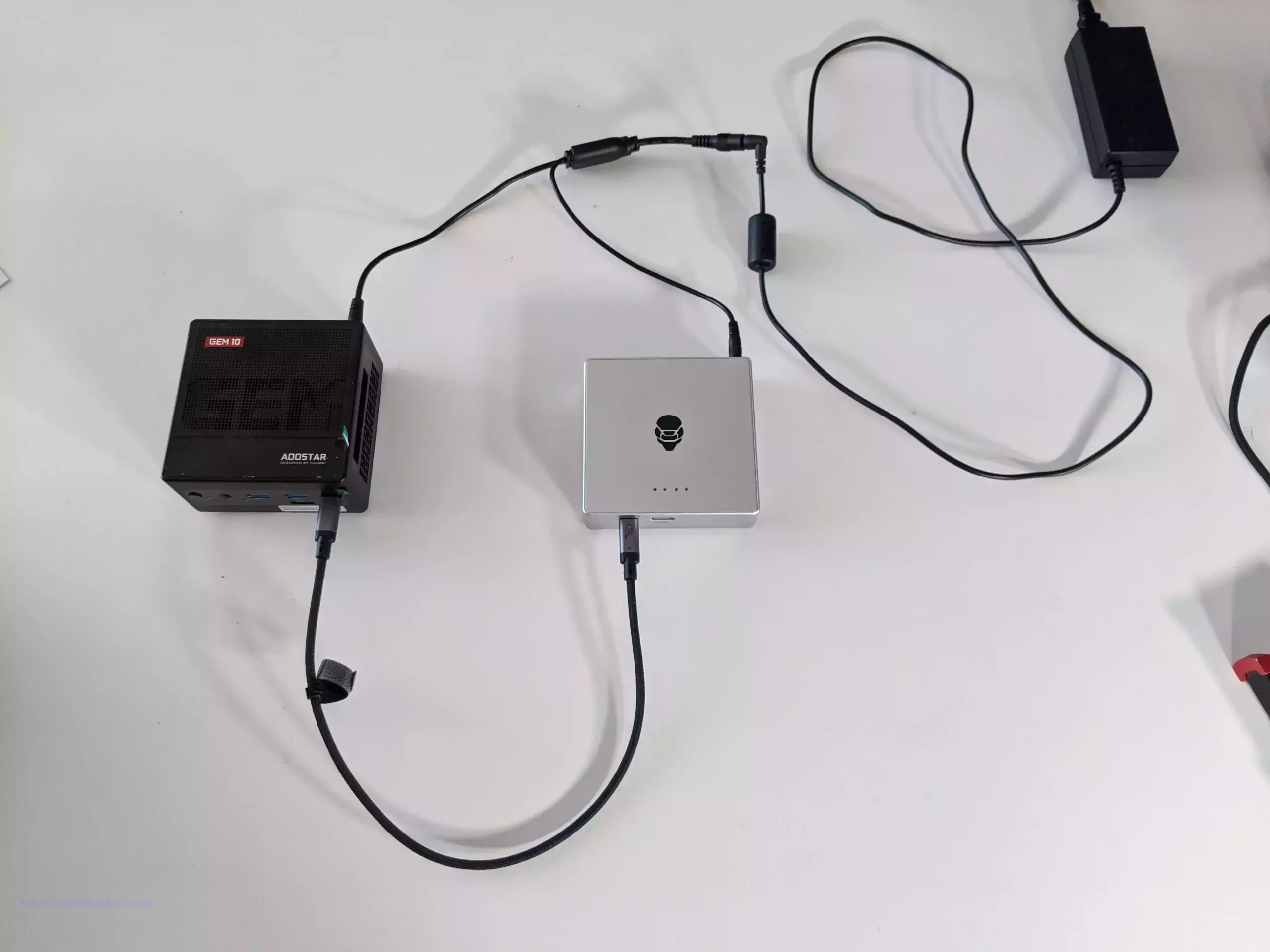
| Performance Test | Results |
|---|---|
| 1 SSD Read Performance | 822MB/s (1GB File Creation, 90x, via Terminal/SSH) |
| 1 SSD Write Performance | 788MB/s (1GB File Creation, 90x, via Terminal/SSH) |
| Copy 1GB from SSD 1 to SSD 2 | 265MB/s (1GB x20, via Terminal/SSH) |
| RAID 0 Performance | 2.5GB/s transfer speed to AOOSTAR GEM10 |
| RAID 5 Performance | 2.1GB/s transfer speed to AOOSTAR GEM10 |
| SSD Read Test Temperature | 47°C peak |
| SSD Write Test Temperature | 46°C peak |
| SSD Copy Test Temperature | 41-42°C peak |
AOOSTAR TB4S-OC – Review Conclusion

The AOOSTAR TB4S-OC NVMe USB4 and Oculink DAS is a versatile storage expansion solution designed to offer high-speed connectivity through USB4 and Oculink interfaces. With support for four M.2 NVMe SSDs and transfer speeds of up to 800MB/s per slot, the device provides users with fast, reliable storage, ideal for expanding both NAS and mini PC setups. Its compact aluminum design ensures efficient heat dissipation, and the inclusion of a base-mounted cooling fan helps maintain optimal temperatures during heavy workloads. The absence of hardware RAID support, however, means it relies on software-based RAID solutions for managing multiple SSDs.
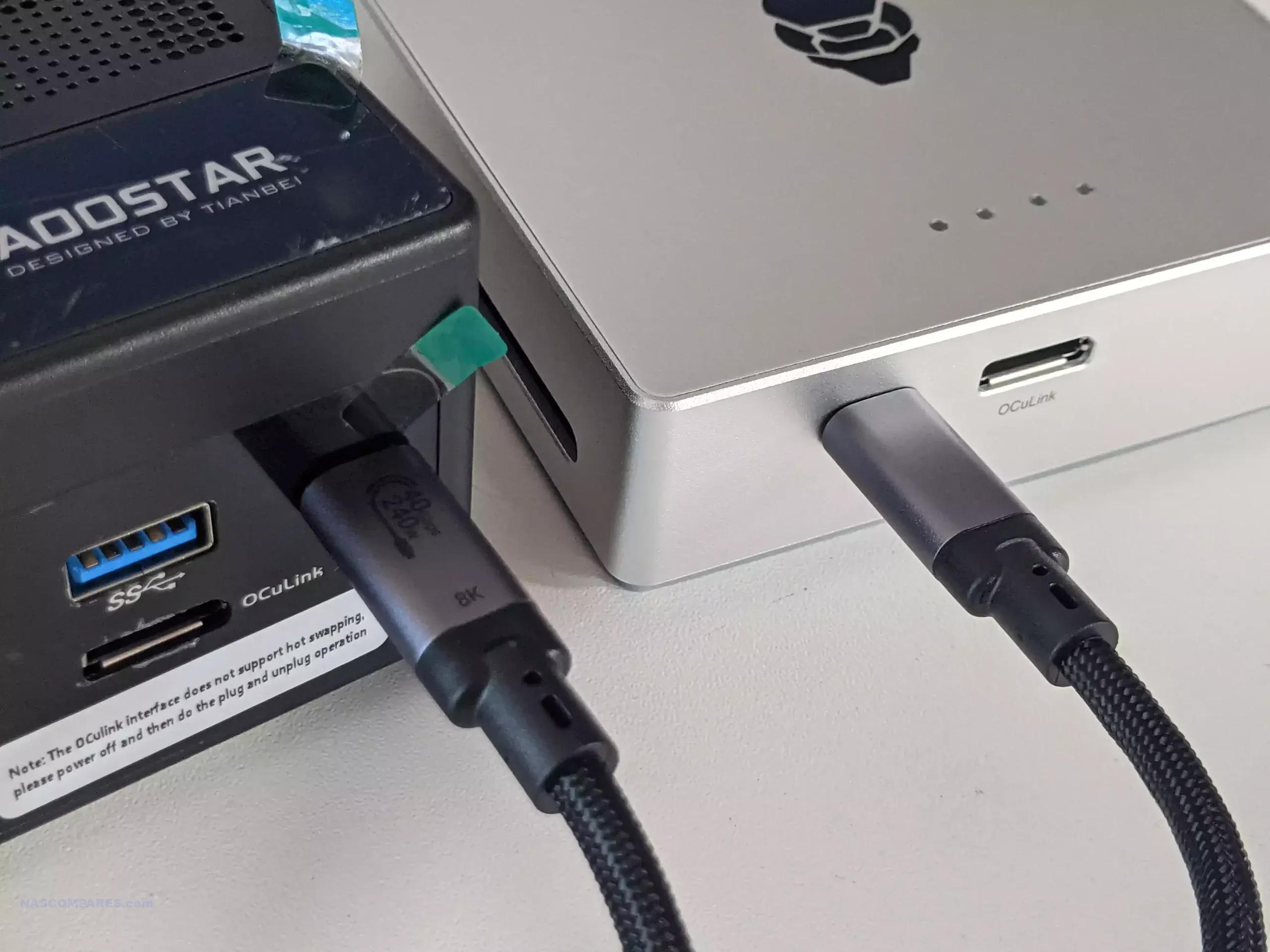
Performance-wise, the TB4S-OC delivers consistent read and write speeds, with 822MB/s read and 788MB/s write during testing. The ability to transfer data between SSDs at 265MB/s makes it a capable storage expansion for professionals requiring additional high-speed storage. In RAID 0 configuration, the device achieved an impressive 2.5GB/s transfer speed to the connected AOOSTAR GEM10 Flash mini PC/NAS, while in RAID 5 it reached 2.1GB/s, balancing speed with redundancy. Its thermal management is also noteworthy, as the device maintains safe operating temperatures under load, peaking at 47°C during intensive read tests. Overall, the AOOSTAR TB4S-OC provides a flexible and efficient storage solution, though users should be aware of its limitations in terms of internal RAID functionality and compatibility with older ports like USB 3.0.
🔒 Join Inner Circle
Get an alert every time something gets added to this specific article!
This description contains links to Amazon. These links will take you to some of the products mentioned in today's content. As an Amazon Associate, I earn from qualifying purchases. Visit the NASCompares Deal Finder to find the best place to buy this device in your region, based on Service, Support and Reputation - Just Search for your NAS Drive in the Box Below
Need Advice on Data Storage from an Expert?
Finally, for free advice about your setup, just leave a message in the comments below here at NASCompares.com and we will get back to you. Need Help?
Where possible (and where appropriate) please provide as much information about your requirements, as then I can arrange the best answer and solution to your needs. Do not worry about your e-mail address being required, it will NOT be used in a mailing list and will NOT be used in any way other than to respond to your enquiry.
Need Help?
Where possible (and where appropriate) please provide as much information about your requirements, as then I can arrange the best answer and solution to your needs. Do not worry about your e-mail address being required, it will NOT be used in a mailing list and will NOT be used in any way other than to respond to your enquiry.

|
 |
ZimaOS is the BEST Beginner NAS OS - Watch Your Back UnRAID and TrueNAS !!!
30TB Hard Drives are TOO BIG ! (and here is why)
COMPLETE UGREEN NAS Setup Guide - 2025 EVERYTHING VERSION
$110 USB4 to 2x10Gb Adapter Review - What the WHAT?
UGREEN NAS Now has iSCSI, 2FA and Jellyfin (and more) - FINALLY!
Seagate 30TB Ironwolf and EXOS Hard Drive Review
Access content via Patreon or KO-FI







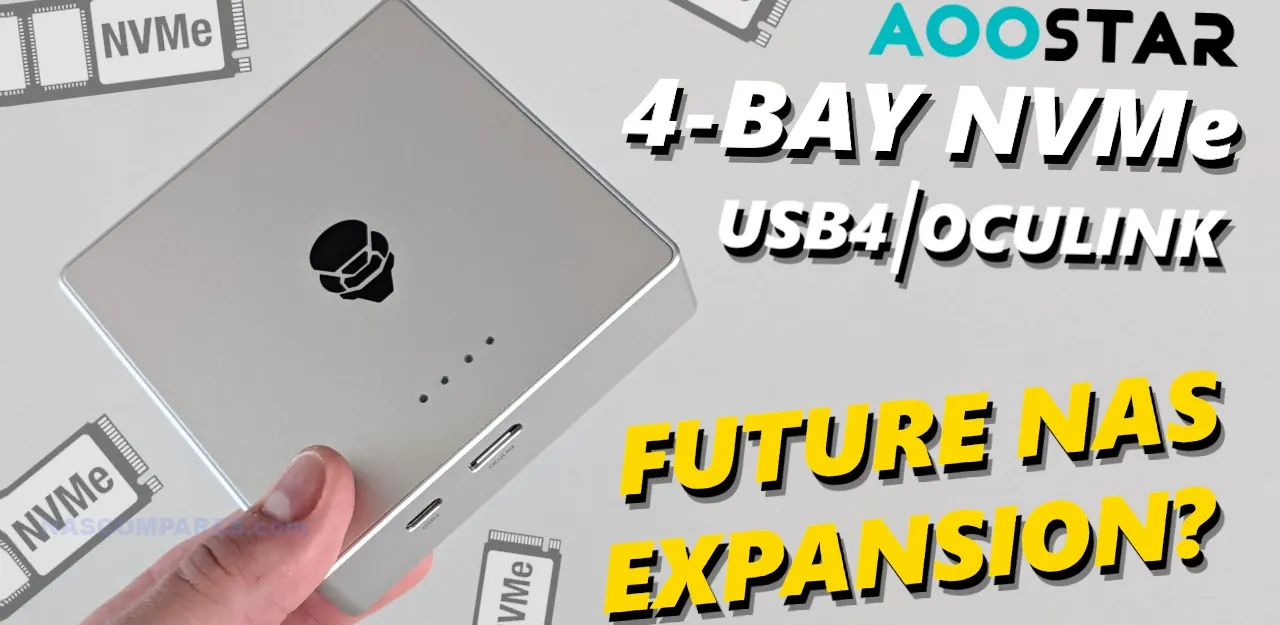





New device without usb-c power?
REPLY ON YOUTUBE
Is there an identical case with 2-4 drive bays + oculink available for a lower price?
REPLY ON YOUTUBE
They need to make one for 3.5″ drives!
REPLY ON YOUTUBE
Aoostar make one for 3.5″ drives!
Removing the networking advantage, would you recommend the minisforum ms-01 over Aoostar gem10 with this bay? I am asking this since it costs the same when you add the extra bay
REPLY ON YOUTUBE
“Great video! Just a heads-up for everyone considering products from companies like Aoostar. While their tech is innovative and affordable, it’s important to be aware of potential security risks. Given the influence of the Chinese Communist Party over private companies, there are concerns about possible backdoors and data privacy issues. Make sure to research independent reviews, use robust security software, and keep your firmware updated. Stay safe and informed! ????”
REPLY ON YOUTUBE
Can you test 2 of these on one system? Love This. Perfect for turning a Gem12 into a flash NAS.
REPLY ON YOUTUBE
Ok so.. one of these m2 expansion boxes connected with occulink to mini pc. The two mini pc usb4>sfp28 adapters. And put 10 bay hdd cases to the usb3 ports. Should make an interesting NAS ????
REPLY ON YOUTUBE
Which is it, 4TB per slot (16TB total)? or 8TB/32 ?
REPLY ON YOUTUBE
Aoostar. Weird name, but absolutely killing it with their products lately. Showing the NAS/DAS makers how it should be done!
REPLY ON YOUTUBE
Please review terramaster f4-424 and f6-424!!
REPLY ON YOUTUBE
I want that, but 4-6 3.5″ bays. No point in doing it with nvme, IMHO
REPLY ON YOUTUBE
The most important part of your written review:
“Limited PCIe Lanes (x1): Each SSD slot is limited to PCIe Gen 3 x1, capping individual drive speeds at around 800MB/s”
What is the point of having 4 nvme drives when you don’t get to use even a fraction of their potential?
REPLY ON YOUTUBE
can i use 4 m.2 to sata adapters and have a total of 24 sata ports ?
REPLY ON YOUTUBE
Pinch me… Is that real?
REPLY ON YOUTUBE
Looks like using ASM2464PDX ?
REPLY ON YOUTUBE
DAS != NAS. Big but slow compared to say a TB4 single NVME enclosure?
REPLY ON YOUTUBE
Can you post pictures of the underside of the PCB? I am curious as to what IC they are using th do the USB-C to PCIE conversion. Is it a TB4 IC by intel or an Asmedia variant?
REPLY ON YOUTUBE
Type C power for not battery powered or 5V 2A are disastrous. Usb power, as all usb in general, are mess of functions, standards, protocols and others crap. As workaround of this they using handshakes. But sometimes charger, that forced to constantly consider existence of several dozens of different charging standards, decided to check wtf he is doing and for this he dropping power to 5v 0.5a and just repeating handshake. Or if charger has more than one port, than also each time something plugged he checked all devices. And for laptop or smartphone it’s fine, because battery backup, but for pc it’s kinda bad.
And it’s all before fact that sometimes charges was “borrowed” without asking permission by father, sister, uncle, friend of sister.
And DC barrel jack are perfectly reliable, easy to replace connection that would 100% work, without thinking about 30 different types of charging.
If you want so much to use type c than just buy for 3$ type c trigger with barrel jack. But problems with handshakes would still be here.
REPLY ON YOUTUBE
Finally! I’ve been asking for hardware like this since oculink branched out of the Enterprise arena and came to consumer products.
REPLY ON YOUTUBE
Curious about MacOS support for this (the official page says Thunderbolt 4 support but makes no mention of the port being Thunderbolt 4. Intel gave much of the technical to USB4 specs but USB4 ≠ Thunderbolt4. Curious also if there is any Linux support and if so which distros.
REPLY ON YOUTUBE
Nice!
Okay, no blazing speeds and a few caveats but in a SOHO environment, it could be a welcome addition.
BTW, I have a few subjects you may want to cover in future videos;
– The malware often found embedded (Intel ME) in several Chinese (mini) MB’s
– QNAP’s upcoming Airgap+
– UnifyDrive Portable NAS
REPLY ON YOUTUBE
Hm… nice
REPLY ON YOUTUBE
Help please. Is there a device that can be bought that provides some, most or all of the features that Jellyfin, Plex or emby provide? I would really like to access my media (at home or away) without being under the thumb of these companies. I’m so tired of unwanted media taking priority and being pushed on us, ads, costs, unwanted changes and updates limiting or completely removing our ability to customize things the way we want. I have Fire TV’s and Firesticks throughout my home that I would like to access my media… You just get used to it, then something changes. So frustrating. I don’t really even care about the internet so much. (If I have access while away, great but not necessary) Just something that I can run from home and have networked throughout. Any suggestions would be greatly appreciated. Thx
REPLY ON YOUTUBE